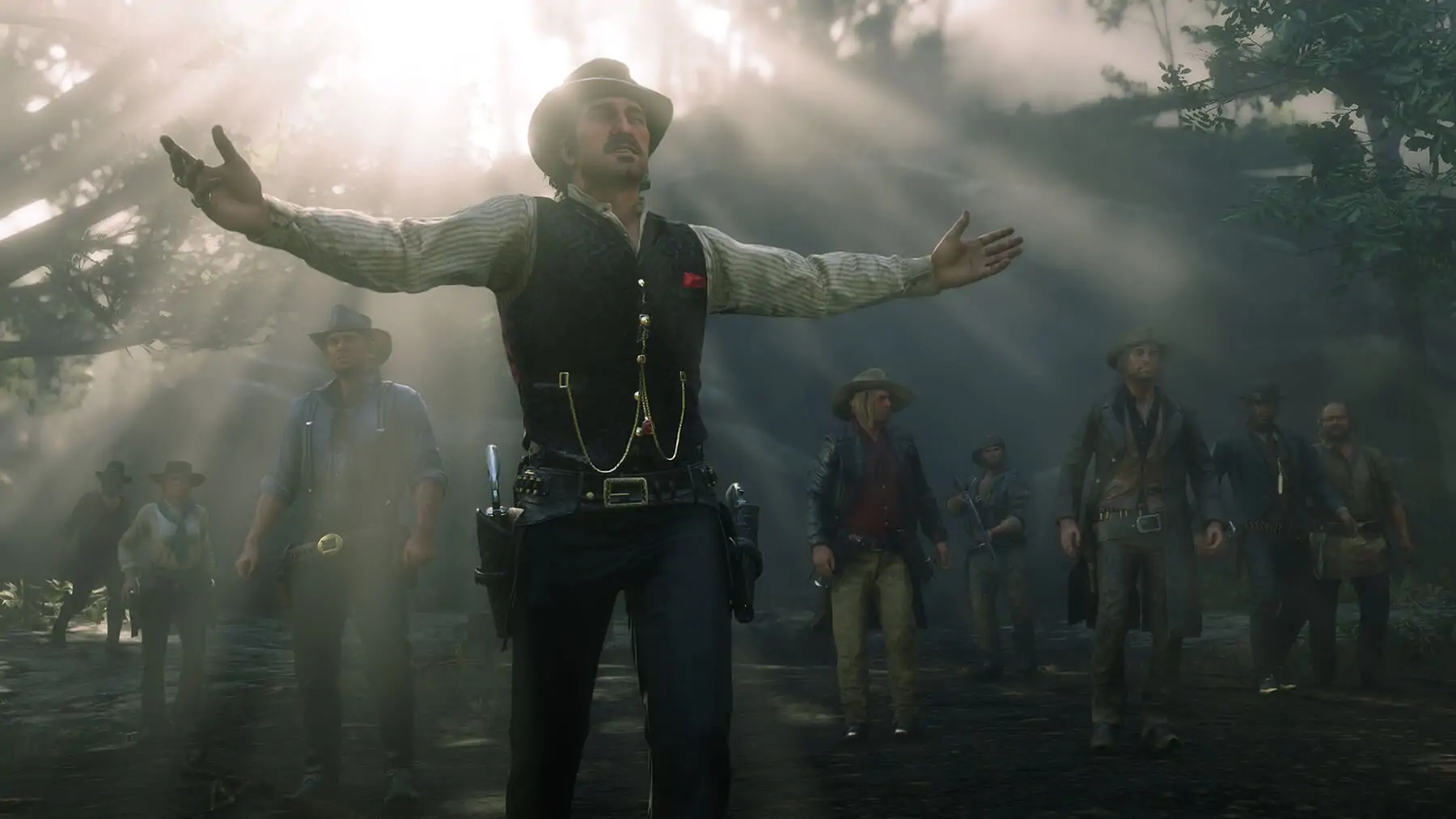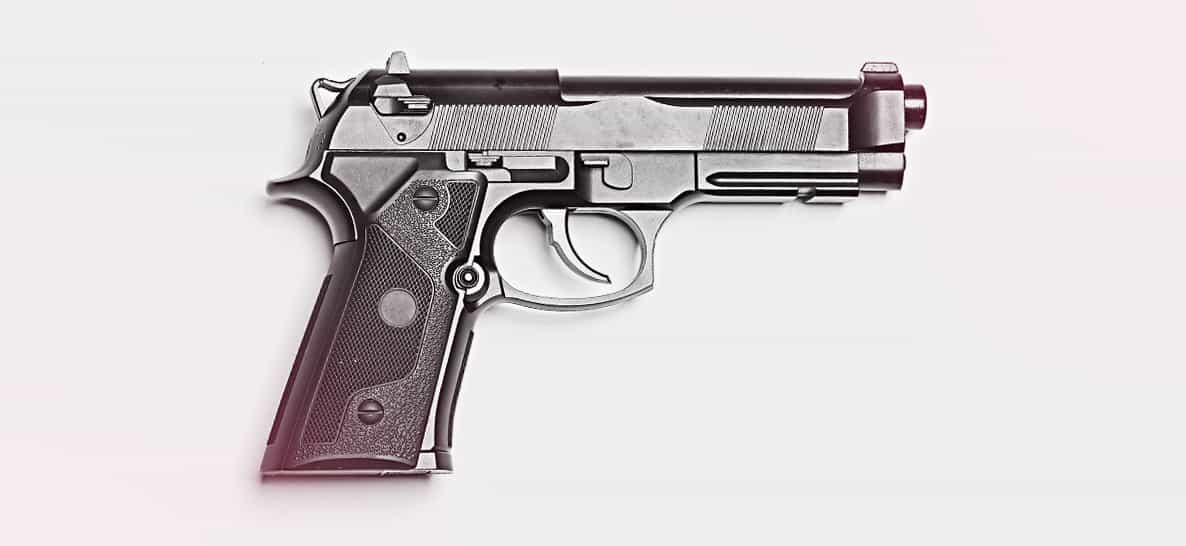
The American West, in the shadow of our memories, is marked by failure. Its emblems—the outlaws, prospectors and pioneers—are extinct. Its achievements, like the telegraph and railroad, have been surpassed. Its possibilities, from the riches to the freedom to the land itself, are spent. The West was a dreamworld in both what it promised and implied, but we’ve interrupted that dream. It’s legend now, and barely that.
Red Dead Redemption 2, the latest video game from developer Rockstar (Grand Theft Auto, Max Payne), takes place in the American Southwest of 1899. The player stands in for Arthur Morgan, one of the surviving members of the Sons of Dutch, a notorious outlaw gang. Rogue criminals used to run wild in these parts, but as Red Dead Redemption 2 begins, the days of unchecked criminality are almost over. Instead of a place where providence comes to the man holding the gun, the game finds Arthur and the others inside a more oppressive context: The world has evolved past the age of gunslingers. Now, the law is after the Sons of Dutch. Justice is literally and figuratively catching up to them.
And so it’s a solemn note that initiates one of the masterpieces of this generation of video games. Red Dead Redemption 2 is not only a boundary-pushing technical achievement, it tells one of the greatest stories in the history of its medium. It merges gameplay with theme in a way that defies convention and subverts expectation. It’s a landmark accomplishment, the innovations of which will infuriate some, rattle more and astound even more than that. It’s not just one of the greatest cultural touchstones of the year, it might be one of the most significant cultural items in a decade, a signifier of how technological progress can not only coexist with narrative ambition, but elevate storytelling in a way that makes the story’s impression and impact deeper, broader and more affecting.
This is the game critics hoped for when they wanted video games to be seen as art. This is the game developers promised, but didn’t deliver until now. Red Dead Redemption 2 is the title you need to know even if you don’t care about video games. It revives and reframes its genre, but it could transform its corner of popular culture, too.

Red Dead developer Rockstar prides itself on what are called open-world games, in which the player has the freedom to go anywhere at anytime. It’s a common style of game now, with franchises as varied as The Legend of Zelda, The Witcher and Super Mario all releasing new titles that boast more autonomy and choice for the player.
For decades, Rockstar has been the standard bearer of open-world games, most notably in its Grand Theft Auto franchise. In titles like GTA: San Andreas, GTA IV and GTA V, Rockstar dropped players into huge maps and let them run amok, stealing cars, crashing planes and firing weapons with abandon. Each release saw the company introduce new software capabilities that allowed for larger play areas, more play options and more ways gamers could embody their characters.
In that tradition, Red Dead Redemption 2 carried a pre-release promise that it would contain the most expansive and detailed open world in the history of video games. It’s a promise the gaming community had heard many times, but in the past, this always meant physical expansion rather than an increase in dynamism or complexity. Before Read Dead 2, a better open world simply meant a bigger one, and without anything to counter that narrative, games like Assassin’s Creed: Origins, Mafia III and Far Cry 5 were praised upon release. They were bigger, so they were better.
But Red Dead Redemption 2 took a counter-approach in creating its open world. Instead of just increasing the size of its map, it would strive to inject every corner of its landscape with meaning. That meant more non-playable characters, more random encounters, more side quests and more activities to try, like hunting and fishing and poker. This world was about density over mass. Maybe you had less room to run here compared to something like The Witcher 3, but in Red Dead 2, Rockstar would make every step count.
And they did. In jaw-dropping fashion, Red Dead Redemption 2 provides a level of interactivity and tactility in its world that most other games avoid if not outright reject. The player can talk to anyone they see. They can enter just about any building. They can ride to anything they spot in the distance. You can pull plants out of the ground, fish from the rivers, track deer through the forest, hitch rides on a stranger’s stagecoach, buy whiskey at the saloon, trim your own beard, watch an old-time movie, play dominos and pet stray dogs. It’s not just a world you play around in; it’s a world you live in.
This level of interactivity is not new to games, but Red Dead 2’s world is distinguished because it functions apart from the player, too. Those people you see have lives, and they will go about their lives whether you’re there to watch. Things will change inside buildings whether you choose to enter them. An animal might come and nibble on those plants. That deer might be killed by a bear before a vulture arrives to pick at its carcass. Someone might take your chair at the dominoes table. The world of Red Dead 2 stands apart not for how you interact with it, but for its indifference to you. Games have never seen anything like it.

In any open-world game, the main story often plays second fiddle for gamers next to the go-anywhere, do-anything experience. The narrative means instruction and limitation, so why bother with that when there’s horses to be stolen and banks to rob? These games are about freedom, so confining yourself to a one-track story feels restrictive. Yet Red Dead Redemption 2’s narrative places that idea of freedom front and center. As you play through it, the heart of the game exposes itself, and that thematic core takes the game beyond a technical marvel to one of 2018’s defining experiences.
The game’s first chapter finds Arthur and the Sons of Dutch fleeing the law among the snow-covered Grizzly Mountains. Your last job went south in a bad way. Bodies of both friend and foe lay behind, members of the gang are missing, and you and the other survivors shack up in a run-down cabin with the hope of regrouping and finding some food. Dutch van der Linde, your leader, tries to rouse everyone with a pep talk, but his voice cracks. Red Dead 2 is clear from the first minute: You’re a wanted, hunted group. You’re weak. Your goal is to survive.
And for the next few hours of game time, that’s what you try to do. As the player, you trudge through knee-deep snow, hunt a deer to feed the camp and plod your horse up the mountains to scout the area. When you’re hungry, you have to look through your pack for a cold can of beans. If your horse falters, you have to feed him an oatcake or something to keep up his strength. If you leave your mount, you have to be sure to grab your rifle from the saddlebags—there might be some bandits in those trees, and you don’t want to be caught unarmed.
It’s a far cry from the pell-mell pace of modern video games, especially for an opening chapter and especially for Rockstar, famous in the past for delivering explosive, action-packed beginnings. Red Dead 2 is methodical and deliberate. Most blockbuster video games like Assassin’s Creed or Call of Duty expediate or eliminate menial tasks to keep you racing into combat, but here, you have to manually search every drawer, open every cabinet and pat down every corpse to find supplies. When you find something worth taking, another button input is required to pick things up and store them. In a gunfight? Make sure you tap the button to load the next round into your rifle. It’s automatic in other games, but not here.
At first impression, these mechanics are confounding. They’re almost anti-video game, and they’ve polarized the gaming community between those who love the difference and those who only showed up to play cards and start bar fights. The immersion of Red Dead 2 is revelatory for some, but for others, it’s a prison.

But for either side, that’s the point. Red Dead Redemption 2 offers freedom to the player only so it can take it away. For these characters, the West is not an easy place to live anymore. The Sons of Dutch might have had a heyday, but that time is past. Now they’re drifters, moving camp every couple weeks to stay ahead of the law and robbing oil barons not for the notoriety, but for the money they need to buy food and munitions. These aren’t the people of legends; they’re people. As the player, you’re just another body trying to stay alive.
That’s why the hyper-intensive world of Red Dead 2 is perfect for its story. This game isn’t about empowering players, it’s about the loss of power. The world’s indifference to you isn’t just a design mechanic, it’s a storytelling mechanic. Legendary outlaw? Fastest gun in the West? That doesn’t matter anymore. Did it ever? What were your glory days, really? Did your mythology ever extend beyond self-perception? You have no glory here. You’re finished.
The player’s biggest ambitions in Red Dead 2—train robberies, bank heists—are almost never rewarded. In fact, they often come with intense, sometimes unforeseen consequences. The game instead asks you to find glory in small accomplishments: catching a rare fish, cooking your venison to perfection, helping a woman by the side of the road. Those quiet moments make the whole experience, and make your existence in the world feel consequential and worthwhile. On the other hand, when Red Dead 2 sees you try for the epic, that sought-after glory emerges as a lie. You aren’t who you thought you were. None of these outlaws are.
That false perception makes the game a struggle—it reinforces the cruelty of the environment and underlines the shock of the narrative—but at the same time, that conflict between the story the player tells themselves and the story they participate in make Red Dead Redemption 2 a triumph of art. The game’s inherent tragedy mirrors the tragedy of the American West itself.
The frontier of the late 1800s promised freedom, but many who ventured into that country met hardship, poverty, disease and death. For some, the solution was to meet that trial with force, to seize freedom and live above the law, but—as Red Dead 2 depicts—the renegades were all crushed by the wheels of technology and progress.
America, in a sense, seems to have regretted that loss even since the turn into the twentieth century. The legend of the American outlaw was co-opted and redefined into something fantastic and mythical. Their violence and criminality was painted over with noble colors. Their brutality was justified. Their lawlessness, excused. It makes a Western video game feel natural—a desensitized time within a desensitized medium—but that makes Red Dead Redemption 2 astonishing. Who would have expected it to not just show the truth of the Wild West, but cast judgment upon it?
This game is everything it swore it would be—gorgeous, intricate, a leap forward for the medium—but it’s nothing like anyone expected. Red Dead 2 makes it challenging just to survive, and processes that would be simple in any other game are rendered meticulous and involved. Some will say this makes the game overrated, anti-fun or arduous, but more will say it’s a masterpiece. This is the exact game Rockstar intended to make. If you’re frustrated, burdened or suppressed by Red Dead Redemption 2, it did its job.

Modern culture finds us burdened by glory, both in our projections of the past and our hopes for the future. Revivals and reboots have to live up to the originals, sequels have to expand their properties in fresh ways and increased demands on our time strap our cultural decisions with immense weight. We started binging a new show? It better be worth the hours. They brought back Star Wars? It better be true to the characters. They’re making a Breaking Bad movie? Better not screw up the series finale. TV shows require perfect endings, movies have to spawn universes, games have to be fun but also challenging but also cinematic but also have 64-person online multiplayer. In everything, we need maximum value, closure and completion.
Red Dead Redemption 2 denies the perfect narrative. It withholds it from its characters and it kills that expectation in you, the player. It’s right for that. The American West crushed people who tried to rise above it. There was no Great American Outlaw because, in truth, none of them were great. They chased ambition and failed, and when they found themselves failing they turned to desperation and savagery. Society responded in kind.
We don’t own much of anything in this world, but we can accept the truth of it. Red Dead 2 gives you nothing for free, but if you put in your emotion and effort, its rewards are profound. Facing reality is harsh, but the game posits it’s better than living out a lie. Either path brings suffering, but redemption’s possible with one.






















